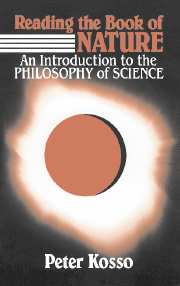Book contents
- Frontmatter
- Contents
- Acknowledgments
- Introduction
- 1 Theories
- 2 Internal and External Virtues
- 3 Explanation
- 4 Confirmation
- 5 Underdetermination
- 6 Observation
- 7 Blurring the Internal–External Distinction
- 8 Coherence and Truth
- 9 Objective Evidence
- 10 Science and Common Sense
- Glossary of Terms
- Suggested Reading
- Index
- Frontmatter
- Contents
- Acknowledgments
- Introduction
- 1 Theories
- 2 Internal and External Virtues
- 3 Explanation
- 4 Confirmation
- 5 Underdetermination
- 6 Observation
- 7 Blurring the Internal–External Distinction
- 8 Coherence and Truth
- 9 Objective Evidence
- 10 Science and Common Sense
- Glossary of Terms
- Suggested Reading
- Index
Summary
The image of objectivity has a lot to do with our generally high regard for science and things done scientifically. Objectively tested claims have a reasonable chance of being true because it is not our personal judgment that makes the call of justification, so it must be nature that does the adjudication. There are two possible sources of information for our ideas, ourselves and the world. Standards of objectivity are intended to quiet, though not silence, the first in the process of justification, in hopes that the second will be heard and understood.
Granting this important role to objectivity is fine as long as we understand what objectivity is or, perhaps more important, what it is not. Using the concept as a stick to beat down theoretical artifacts or as a banner to advertise warrant to believe that a theory is true demands an awareness of the limitations of objectivity as a useful, recognizable concept. It does not help the cause of validation in science to appeal to an idea of objectivity as reference to external objects or events. It does not help, for example, to claim that the concept of “electron” is objective just in case there are such things as electrons, because the truth of the claim that there are electrons is exactly the sort of decision that an appeal to objectivity is supposed to help. Nor does it get objectivity's work done to describe it simply as intersubjectivity.
- Type
- Chapter
- Information
- Reading the Book of NatureAn Introduction to the Philosophy of Science, pp. 159 - 176Publisher: Cambridge University PressPrint publication year: 1992



